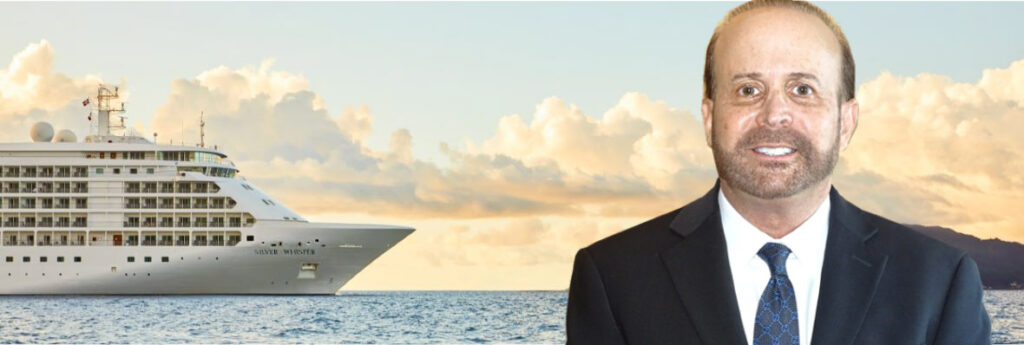With a return to Asia just announced for later this year, all 10 of its ships in service again after the pandemic, and the much-anticipated Silver Nova on the way in 2023, Silversea Cruises is sailing smoothly again as the world returns to travel.
But even with so much on the go, the cruise company – now owned by Royal Caribbean International – has not forgotten Canada, which continues to be a strong market for the small, ultra-luxury line, which considers itself the top of its class.
During a recent visit of the Silver Whisper to Quebec City, Silversea Canadian representative Ann Layton revealed that Canadian bookings for 2023 have increased by almost 60% this year over 2019 numbers, and that more passengers are already scheduled to sail with the cruise line in 2023 than all of 2022 combined.
Indeed, Silversea is well on track to meet its goal of doubling its number of Canadian guests by next year.
And where are they going? Alaska, the Caribbean, Europe, and expedition cruising – including the two polar regions. Far East travel has also jumped to nearly 10% of bookings, compared to a mere 1% before.
Silversea exec Brad Ball says Canada is a “natural market” for Silversea, not least, he told Travel Industry Today, because he believes we are adventurous travellers, which is borne out by strong bookings for Arctic and Antarctic cruises.
The cruise line is also less American-centric, boasting an international clientele that appeals to cosmopolitan Canadians.
Beyond that, Silversea appeals in the post-pandemic environment, due to its smaller ships sizes, which have fewer guests and can also get into more intimate and off-the-beaten track destinations due to small ship sizes, he says.
And with fewer line-ups and considerably less than 3,000 fellow passengers (guests range from about 100 to 600 depending on the ship), “It does feel like your own private yacht,” he says. “You can create your own little bubble.”
Fewer guests also means less time in lines, at the buffet and getting on and off in port. “It’s like stepping out of your hotel,” he says of the latter advantage.
Coupled with longer time spent in the destination (arriving early in the day and leaving late at night), he says, “Something about small ships is special – you get a connection with the destination.”
Indeed, he says, “We call (our ships) floating five-star hotels.”
Back on board, Silversea is renowned for its superior service, gourmet excellence, butler and 24-hour room service, and 1:1 staff-to-guest ratio, but it intentionally eschews typical bells and whistles for overall elegance. Guest lecturers provide a cerebral element, evening shows are “light,” not elaborate, and casinos an afterthought. In fact, many guests, tuckered out from busy days in port, prefer a quiet evening and early slumber.
And while Silversea is certainly more expensive up front, Ball notes that there is great value built into the experience, from complimentary shore excursions (one per port) and shuttle buses to town, to free drinks/wine, fitness classes/yoga, and Internet onboard. And all gratuities are also included.
“We don’t nickel and dime you at the end of the cruise. No one is shaking you down,” he laughs.
At the same time, guests can add door-to-door packages that include business class air and hotels at generally less expensive rates than they could arrange on their own.
And it’s a system that works with 60% repeat clientele on cruises. “Our guests are pretty savvy and not frivolous,” Ball observes. “They’re aware of the cost of cappuccinos, wine, and gratuities… Whether you’re buying a Toyota or Mercedes, you still want to see the price and not have sticker shock.”
He adds, “We used to say that if you had to ask how expensive Silversea was, you couldn’t afford Silversea. Now we talk about value.”
In part that’s because Silversea also feels it’s competing against land-based resorts.
“We don’t see ourselves as a cruise line,” he says. “We’re competing for people who never thought they would want to cruise.”
Those who do sail on Silversea are invariably adults (kids are welcome but not catered to), average age 54.
“We’re proud to say to say we’re baby boomers,” says Ball, who notes a younger demographic on the activity-filled expedition ships.
Guests tend to have the time and money to travel, he says, and increasingly an ability to do their jobs remotely.
With plenty of cruise stops in Canada on its Maritime and Alaska itineraries, Silversea typically welcomes travel agents onboard to check out the product whenever possible (sometimes with clients), as well as hosts FAMs.
Ball says the cruise line depends on travel counsellors, not least because luxury is “a hard product” for consumers to adequately understand, making it a “no-brainer” that they would book with an agent. He notes that Silversea doesn’t sell direct.
“We started with travel agents,” he says, “and that will continue to be our business model.”

